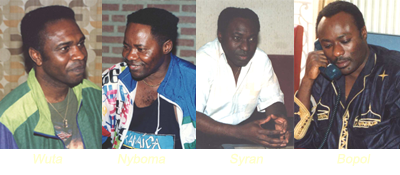|
|
 Quatre Etoiles (Four Stars), Congolese rumba band, formed 1982. Bopol Mansiamina (born Kinshasa, June 27, 1949; died Paris, Nov. 7, 2021; bass, guitar), Syran M'Benza (born Kinshasa, May 31, 1950; guitar), Nyboma Mwan Dido (born Nyoki, Congo-Kinshasa, Dec. 24, 1952; vocal), Wuta Mayi (born Kinshasa, Aug. 3, 1949; vocal). Quatre Etoiles (Four Stars), Congolese rumba band, formed 1982. Bopol Mansiamina (born Kinshasa, June 27, 1949; died Paris, Nov. 7, 2021; bass, guitar), Syran M'Benza (born Kinshasa, May 31, 1950; guitar), Nyboma Mwan Dido (born Nyoki, Congo-Kinshasa, Dec. 24, 1952; vocal), Wuta Mayi (born Kinshasa, Aug. 3, 1949; vocal).
The Quatre Etoiles came together in Paris in 1982 under the auspices of producer Ouattara Moumouni. Bopol and Syran had been working off and on in Paris ever since the African All Stars split up in 1979. At their urging, former Bella Bella singer Nyboma left Togo, where he had been working with other remnants of the All Stars, and moved to Paris at the beginning of 1982. The trio became a quartet with the addition of O.K. Jazz singer Wuta Mayi, who had shared the stage with Bopol in several bands including Papa Noel's Bamboula. The group's four-song effort for Ouattara, in the up-tempo rumba style that came to be known as soukous, billed them as "4 Grandes Vedettes de la Musique Africaine" (four great stars of African music).
The four musicians adopted a novel approach to organization. Having chafed under tight restrictions as members of other bands, they developed a loose-knit partnership that fostered loyalty to the group while granting freedom for the partners to engage in outside projects. Each musician did session work, and each recorded solo albums, often with the help of one or more of the others.
The musicians officially adopted the name Quatre Etoiles for a second group recording at the end of 1983 for producer Ibrahima Sylla. Known by its lead track, Wuta's composition "Enfant Bamileke," the album was a soukous sizzler whose tremendous popularity brought offers for concert tours. Augmented by additional musicians, the group played the capitals of Europe and Africa and toured occasionally in the U.S. Subsequent releases, including 6 Tubes (6 hits, 1986), Les 4 Etoiles (1991), and Adama Coly (1995), were also well received.
Meanwhile each musician recorded outside the group. Bopol's Manuela and Samedi Soir from the eighties were exceptional. Syran's Symboise (1990) with the other Quatre Etoiles plus Diblo Dibala and Lokassa ya Mbongo lived up to its claim of employing "the best of Paris." Nyboma scored two hits in the company of Pepe Kalle, Zouké Zouké (1986) and Moyibi (1988). And, in addition to his largely overlooked solo work, Wuta contributed vocals to Papa Noel's outstanding 1994 release, Haute Tension.
While they fit the soukous mold—indeed they helped to create it—the musicians of Quatre Etoiles possessed a feel for the conventional rumba that many of their younger colleagues, whose careers were made in Paris, lacked. Each was a pedigreed performer from the heyday of the Congolese rumba, only a generation away from the music's founders. This connection with the past served the musicians well as they undertook the process of modernization. As solo artists and as a group, the Quarte Etoiles produced a body of work that ranks among the best of the eighties and nineties Congolo-Paris scene.
© 2011 Gary Stewart
SELECT DISCOGRAPHY
Les 4 Etoiles (Celluloid 66895-2) 1991; Sangonini (includes two tracks from Enfant Bamileke, all of 6 Tubes, plus new material, Stern's STCD1049) 1993; Adama Coly (Lusafrica 08728-2) 1995; Live in London (bornMas BMP960086) 1997.
SELECT BIBLIOGRAPHY
C. Stapleton & C. May, African All-Stars (London, 1987); G. Stewart, Rumba on the River (London and New York, 2000).
|

